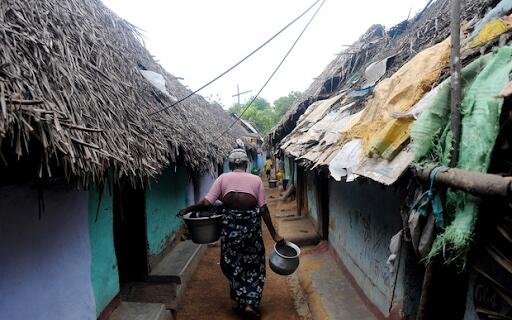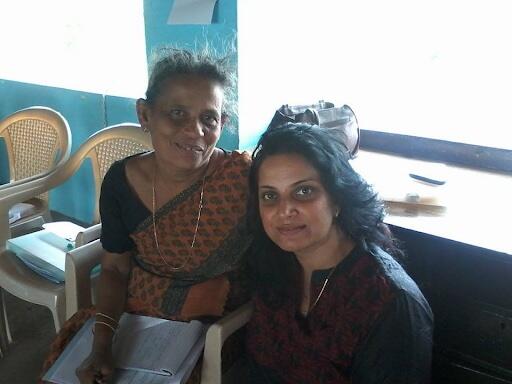
Oct. 8, 2021
Sharing their stories: Social work-led researchers are studying Horn of Africa migrants in greater Washington
Share this story
Miriam Kuttikat, Ph.D., has been to India multiple times to study Tamil refugees displaced by civil war in Sri Lanka. Her work began with a visit to a refugee camp in 2007 and included six additional trips over the next decade. Along the way, Kuttikat’s efforts evolved from a clinical social work focus to a research trajectory, shaped by both her field of expertise and the use of evidence-based and community-engaged interventions to help people.
"Our field [social work] may be distinct among professions for its efforts to ameliorate the most challenging societal problems experienced by society's most vulnerable populations," said Kuttikat, an associate professor in the Virginia Commonwealth University School of Social Work.
Those vulnerable populations come with harrowing stories. Kuttikat remembers one from a refugee mother who traveled to a camp in India by boat. She quoted the mother's words:
"After several hours in the boat, my son got severe chorukku (seasickness). He died in my arms. I did not have any breast milk to feed him. I could not even give him a drop of good water before his death.”

Understudied populations
More than a decade into her work with Tamil refugees, Kuttikat is now embarking on a related study much closer to home, and supported by an award this past summer from Virginia Commonwealth University’s Presidential Research Quest Fund. Working under a project initially titled “Testing Family Dynamics Among Eritrean Migrants in the Greater Washington, D.C., area," Kuttikat has expanded her work with Eritrean migrants and refugees to include those from additional Horn of Africa countries: Somalia, Ethiopia and Djibouti.
"Recent research showed that the Washington, D.C., region — including Northern Virginia and Northern Maryland — has emerged as one of the top destinations for African migrants, particularly [Horn of Africa] countries," Kuttikat said. "More than 181,700 African-born people live in the D.C.-Virginia-Maryland area, and it is one of the most significant Black migrant populations in the area."
The key social issue, Kuttikat said, is that there is a gap in providing mental health and health support services because these populations have been understudied.
"Anecdotes from the field state that there is no statistical evidence to decide the percentage of those who are living in poverty, their average income and how many Horn of Africa migrants seek health support," Kuttikat said. "These anecdotes substantiate my clinical experience with this population; there is a significant gap in developing sources of support and implementing interventions for the [Horn of Africa] migrant community because they are understudied, high-risk and vulnerable populations.
"They are more likely to experience inequities in access to and use of health care and health disparities, leading to a high risk for migration-related stressors that negatively affect their health and well-being.”
The project, Kuttikat said, aims to identify Horn of Africa migrants' daily life stressors, family dynamics and health care challenges and “develop data to submit a comprehensive study proposal to develop culturally appropriate and evidence-based interventions.” These study results, she said, will significantly increase Horn of Africa migrants' quality of life and reduce follow-up treatment costs.
The research team includes faculty collaborators David Chan, Ph.D., an associate professor in the Department of Mathematics and Applied Mathematics in the College of Humanities and Sciences, and Kyeongmo Kim, Ph.D., an assistant professor in the School of Social Work; social work Ph.D. students Jennifer Murphy, Paola Roldan and Muna Saleh; and social work master's students Sarah Nieburg and Jennifer Ramachandran. The group will also partner with community agencies such as Bond Unbroken and the International Rescue Committee.
Chan, whose current work includes analyzing student support networks and their effect on student success, will develop a similar model for immigrant support networks.
"My hope is that this research will lead to better outcomes for these immigrants by understanding what supports are working, which are not working and possibly what supports are missing and would be helpful if included," he said. "I believe this research is important not only to these immigrants, but some of these results could help other immigrants in other places."
Kim, meanwhile, brings expertise in aging and gerontology, refugees and immigrants, and mental health.
"This is an opportunity to examine family dynamics and stressors to develop a culturally tailored intervention," he said.
Haben Ghebremeschel formed the nonprofit Bond Unbroken as a resource to teach the native Eritrean language of Tigrinya. Ghebremeschel, whose parents immigrated to the United States from Eritrea in 1985, cited the importance of cultural norms, like a native language, in fostering positive generational family dynamics and improving community support services.
“Sometimes the language is part of what’s lost and doesn’t get passed down through generations,” said Ghebremeschel, who will serve as a community liaison on the project and help connect the research team to additional community partners and interview subjects from the target populations.
“It’s also about seeing where the reluctance is within these communities and then also seeing where the resources could transform into something more accommodating to the cultural backgrounds of those they seek to provide support to,” Ghebremeschel said. “I think sometimes there’s a universal Band-Aid on mental health issues, and I don’t think they’re really targeted toward the trauma that particular communities face. If care providers had a bit more cultural understanding — grew up in the culture or adjacent to it — that could be beneficial in assuring information provided to migrant families would find its way through these different types of support routes.”
That approach resonates with Kuttikat, who uses a community-based participatory research model that "practices equal partnership between researchers and migrant communities.”
“The [community-based participatory research] approach helped me build trust and solid relationships with migrant communities, enabled me to walk through the experiences of migrants, and voice the vulnerable and invisible migrants,” she said. "Horn of Africa migrants will have equal ownership of developing and implementing these interventions because they are part of the [community-based] approach we use in our research."
‘The continuous expression of their pain can heal them’
In her Tamil study Kuttikat has examined migration trauma, psychological stress, repatriation challenges, intergenerational conflict and family dynamics. The National Institutes of Health’s Fogarty International Center funded her research from 2013-18.
"I developed a community intervention to address their family stressors, family conflict, parenting challenges and family health," Kuttikat said of the NIH-funded work. "We conducted studies with 120 refugee parents and their 120 adolescents; many of them were child soldiers, victims of physical and sexual assault and land mine survivors.
"We had quantitative surveys and qualitative interviews on their family dynamics and focus groups on developing intervention components. I continued to track them until 2018 to trace their life changes as the adolescents became young adults. For the next round of research, I will be going back to test the pre- and post-changes among families during the multilevel family mental health intervention."
Kuttikat said it is natural to have an emotional response to refugees' experiences, but the key is for researchers to have their own mentors or counselors to discuss their experiences. For the refugees, sharing traumatic stories can be cathartic.
"I found that the continuous expression of their pain can heal them," she said. "I believe people's stories have a way of taking care of them; we must learn to give them a way where they are needed."
She still remembers the words of the mother whose son died in the boat on the way to India.
"I held him in my arms for hours, holding him close to my breath to give him warmth,” Kuttikat said, quoting the mother's words. “The boat mates did not want to travel with a dead body that would attract eagles. I was forced to throw my son's body into the sea.
"I saw his body floating in the water. Kadalamma (Mother Sea) took my son. What did he do to die at such a young age? Why did this happen to me? Why?"
Subscribe to VCU News
Subscribe to VCU News at newsletter.vcu.edu and receive a selection of stories, videos, photos, news clips and event listings in your inbox.







